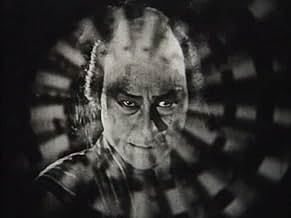A paucity of descriptive intertitles, combined with mildly jumbled sequencing of the scenes and narrative, means that 'Jujiro' is perhaps not the easiest film to engage with off the bat. This is partly a reflection of being a silent production, but there's also no mistaking as we watch that there's a sense of artfulness to it all that means directness and clarity is eschewed in favor of aesthetic composition. What disorder that presents also pairs neatly with a sometimes phantasmagorical arrangement of shots and imagery - rich surroundings, laughing people, flashing close-ups - that overlays an air of psychological drama to the tableau as it unfolds, especially as the tale grows more dire. And with that - even if initially hard to parse, it becomes ever easier to be invested in the story, and admire all that the film has to offer. 'Jujiro' is distinctly bleak, but for anyone able and willing to abide the various demands of viewership, this is well worth seeking out.
When I mention the artistic touches to the picture, that most especially applies to the arrangement of each scene and shot, bolstered with robust editing. But the same careful attentiveness is seen in every aspect of the feature's craft, including hair and makeup, costume design, set design and decoration, lighting, and so on. Moreover, much great credit to everyone in the cast - including especially Akiko Chihaya, most prominent as the unnamed sister - for lively performances that vividly realize their characters. Every display of acting is a brilliant, gratifying demonstration of range, nuance, and physicality, making the figures in this sorry saga seem very desperately real. It is in no small part through the actors' sharp embodiment of the grim despair, heartbreak, cruelty, and otherwise strong emotions that the greatest impact of 'Jujiro' is felt, and it's a pleasure as a moviegoer to watch them practice their art.
Yet of course none of this would be possible without the remarkable intelligence of filmmaker Teinosuke Kinugasa to conjure the picture in the first place. In every regard - characters, dialogue (related through intertitles), scene writing, and the narrative at large - his screenplay is a searing, dynamic, engrossing examination of the dark depths where love can lead us without wisdom to temper our judgment. The brother's naive pursuit of a woman on the street leads to deep trouble, and the bond he shares with his sister means that she in turn falls in endeavoring to aid him. For the hardship endured by these primary sympathetic characters, and the depravity or indifference illustrated in others, 'Jujiro' in some ways comes across as more than a little nihilistic. And still, for all that, Kinugasa's skills as a director match his penmanship, and he exhibits a terrific keen eye and guiding hand as he oversees the production. This is a silent film that provides a feast for the eyes at the same time that the content nourishes our mind, and if difficult, the result is a satisfying, rewarding experience as a viewer.
For absolute lack of sound or music, and given how superficially disjointed the presentation may at first seem, I wouldn't say this is a title for audiences that already struggle with silent films. In every regard - writing, direction, acting, technical craft and rounding details - there is so much to take in with this picture, but it requires intent immersion to ensure we don't get left behind as the length progresses. Importantly, however: though arguably imperfect for the challenging construction that would repel some potential viewers, that quality also makes it all the more fruitful as the narrative advances. The themes, content, and fundamental orchestration mark this as a movie that won't be for everyone. In my opinion, however, 'Jujiro' is as worthy and accomplished as it is somber and disheartening - a finely made cinematic drama that deserves much more recognition. Wherever you're able to watch it, this is well worth 80 minutes of your time.




















